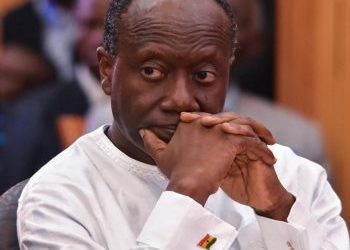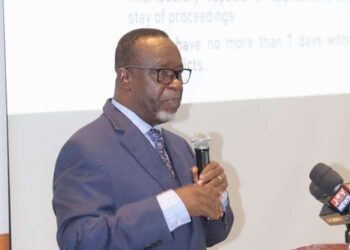The Herald ,has dug out more details on the US$1.65 billion transaction between Ghana National Petroleum Corporation (GNPC) and the Norwegian oil company; Aker Energy, further revealing how untruthful those pushing the deal had been to Ghanaians with respect to the cost of the Floating Production Storage and Offloading (FPSO); a key component.
The Indian owners of Reliance Industries offshore which has been using the FPSO Dhirubhai-1, the marine vessel Aker intends to deploy to do the drilling of the Pecan fields in partnership with GNPC, have confirmed releasing the vessel to Aker Energy for US$35 million as captured in its “fourth quarter and preliminary annual results 2021”.
This paper recently reported on a case of an inflated price identified in the botched GNPC-Aker Energy transaction in which GNPC was willing to pay Aker US$1.65 billion to acquire a 37 percent stake in the Deepwater Tano/Cape Three Points (DWT/CTP) and 70 percent interest in SDWT.
The inflated price, has to do with the cost of the FPSO marine vessel, used by the offshore oil and gas industry, for the production and processing of crude oil.
It emerged that Ghana, would have lost a colossal amount of US$565 million, if the deal had gone through in the form and shape it was presented by the GNPC, last year.
The two institutions had been involved in negotiations to acquire Ghanaian oil blocks, and needed an FPSO for the exploration of the crude oil.
Interestingly, while the state-owned GNPC is quoting whopping US$600 million, Aker Energy says the FPSO, is rather costing a paltry US$35 million; US$565 million less than what officials of GNPC led by its immediate past Chief Executive Officer (CEO), Dr Kofi Koduah Sarpong, had in presentations told Akufo-Addo’s cabinet, the Ghanaian media and civil society organizations during the heated GNPC-AKER debate, last year.
But https://hawilti.com an internet news portal carried a news item dated September 13, 2021, which said that “Aker Contracting FP ASA, an indirect subsidiary of Ocean Yield, and Aker Energy have notably entered into an agreement under which Aker Energy is granted an option to acquire the FPSO for $35m”.
The report also revealed that “because Aker Energy had previously paid Ocean Yield $17.9m as compensation for prior options on the same FPSO and related services, Aker Energy’s total investment to purchase the FPSO will amount to $52.9m, shall the option be exercised.
With this revelation, it is not clear which of the two institutions to believe as the owner of the FPSO and how much it is paying for it.
Dhirubhai-1 FPSO was built in 2008 with an oil production capacity of 60,000 barrels of oil per day. According to Marine Traffic, it was converted from a Suezmax tanker to an FPSO in 2008. It flies a Bahamas’ flag and has its IMO as 7500877.
Some officials who were very instrumental in the GNPC-Aker Energy transaction have sought to downplay the confusing figures saying no FPSO cost US$35 million. Have even suggested that Dhirubhai-1 FPSO is just an empty tank to be retrofitted to become a proper FPSO hence the US$600 million the GNPC quoted was merely a projected cost.
But Aker Energy, neither talked about Dhirubhai-1 FPSO being an empty tank nor something to be retrofitted as claimed by the GNPC elements and some of their key allies in the opposition National Democratic Congress (NDC). Aker Energy has rather sought to beat a deadline of the second quarter of 2022.
“Aker Energy and license partners are working to submit a revised Plan of Development for the DWT/CTP block by the end of second quarter 2022, Aker Energy had said in the “Aker ASA Fourth quarter and preliminary annual results 2021”, adding “during the quarter Aker Energy secured further financing from African Finance Corporation of an additional 100 million dollars in senior secured convertible bonds”.
https://hawilti.com had reported that “Ocean Yield’s Dhirubhai-1 FPSO, which was contracted by Reliance Industries offshore India from September 2008 to September 2018, is the likely contender to be redeployed offshore Ghana for the development of the Deepwater Tano Cape Three Points block where lies the Pecan field. The vessel was converted in 2008 and has an oil production capacity of 60,000 barrels of oil per day (bopd).
“Ocean Yield is majority-owned by Aker Capital, whose company Aker Energy Ghana is the operator of the Deepwater Tano Cape Three Points block offshore Ghana. While KKR is set to take over the management of Ocean Yield from Aker Capital, Aker Energy still has an option to acquire the FPSO for its Ghanaian deep-water project.
“Aker Contracting FP ASA, an indirect subsidiary of Ocean Yield, and Aker Energy have notably entered into an agreement under which Aker Energy is granted an option to acquire the FPSO for $35m. However, the option is exercisable within a very particular timeframe: at the earliest 16 business days prior to settlement of KKR’s upcoming voluntary cash tender offer, and no later than 15 December 2021.
“Because Aker Energy had previously paid Ocean Yield $17.9m as compensation for prior options on the same FPSO and related services, Aker Energy’s total investment to purchase the FPSO will amount to $52.9m, shall the option be exercised.
“Discovered in the early 2010s by American independent Hess Corporation, the Pecan field is expected to be Ghana’s next major offshore oil & gas project. By the time the Aker Group acquired operatorship in 2018, Hess had already made seven discoveries, out of which all but one (Cob-1) had been declared commercial.
“The project has always been a priority for Ghana and targeted first oil by 2021, but suffered several delays, first because of the maritime boundary dispute between Ghana and Côte d’Ivoire, settled in 2017, then because of the Covid-19 pandemic. In March 2020, Aker Energy notably issued a notice to Yinson Holdings terminating the Letter of Intent for the FPSO’s charter, operations & maintenance contract it had initially planned to award to the Malaysian contractor.
“Since then, Aker Energy Ghana committed to finding a revised phased development to move the project forward, including via an alternate concept based on the utilisation of two small-sized FPSOs: one redeployed FPSO on the crest of Pecan in Phase 1 and another one in the North of Pecan to tie back additional resources in the northern part of the field in Phase 2.
“However, Ghanaian authorities have grown impatient and in August 2021, Minister of Energy Hon. Dr. Matthew Opoku Prempeh presented a paper to Ghana’s Parliament according to which the state-owned Ghana National Petroleum Corp (GNPC) would acquire a 37% additional interest in the DeepWater Tano/Cape Three Points (DWT/CTP) Block.
“The same day, Minister of Finance Hon Ken Ofori-Atta had presented a Loan Agreement between the Government of Ghana and GNPC Explorco for the grant of a loan of up to $1.65bn for the company to meet its payment obligation to acquire the shares in Aker Energy Ghana while also contributing to a Capex of $350m over the 2021-2024 period to achieve first oil from Pecan Phase 1.
“The deal was suspended after it was discovered that GNPC did not conduct any due diligence on the wells before expressing interest in them willing to cough up a massive US$1.62 billion.
“Dr Sarpong and Dr Baah-Nuakoh, GNPC’s General Manager, Sustainability and Stakeholder Relations in many power point presentation, said “Aker’s share of cost = US$740 million, comprising FPSO (US$600 million) and cash calls and IGC financing (US$140 million)”.
The Herald that the Norwegian company in its “Fourth quarter and preliminary annual results 2021” mentioned that “Aker Energy and its license partners have secured the FPSO Dhirubhai-1, from Ocean Yield for USD 35 million, for the Pecan field development and are working to firm up cost and schedule and further optimize the concept to mitigate cost inflation”.
The report said that, “Aker Energy is an E&P company aiming to become an offshore oil and gas operator in Ghana”, adding “Aker Energy and license partners are working to submit a revised Plan of Development for the DWT/CTP block by the end of second quarter 2022”.
Benjamin Boakye of the African Centre for Energy Policy (ACEP) was the first to identify and raise issues with the inconsistency in the amounts presented by the two institutions i.e. GNPC and AKER-Energy.
He took to his Twitter handle, saying “in the same accounting year, the cost of the same FPSO is $600m to GNPC and $35m to investors. Activist saved Ghana from the #Aker transaction. I hope the media houses that said CSOs were Anti-Ghana are following the numbers”.
Dr Sarpong, in his farewell message to GNPC workers had stated that “Aker Energy’s Pecan Field will come onstream in the very near future” meaning the Akufo-Addo government was still interested in the deal.
Aker-energy in the “Fourth quarter and preliminary annual results 2021” also stated that “during the quarter Aker Energy secured further financing from African Finance Corporation of an additional 100 million dollars in senior secured convertible bonds. Aker Energy is evaluating different strategic options for its ownership in the DWT/CTP block. In August 2021, the Ghanaian Parliament approved a mandate for GNPC to negotiate a transaction with Aker Energy regarding a potential acquisition of a stake in the DWT/CTP block”.
The Herald is also investigating a report that the Aker deal has been whittled down to around US$300million from a high of $1.6 billion.
Sometime last year, many civil society groups and personalities challenged the GNPC-Aker deal. One such person was Dr Theo Acheampong, a Petroleum Economist and Political Risk Analyst, who stated that the proposed $1.65bn Aker Energy/AGM–GNPC farm-out deal is overpriced.
He told Accra-based Joy FM on its Super Morning Show, Tuesday, August 10, that “in my view, there’s overpricing of the assets, the assumptions that went into the assets need to be questioned and we shouldn’t be paying for the amounts that are being quoted”.
Dr Acheampong, stressed that the oil price being used i.e $65, $67 per barrel, for the transaction, is questionable.
According to him, the valuation could have been based on between $50 and $55 dollars per barrel, which will reduce the value of the entire transaction substantially.
He further stated that after consultations with experts in the oil and gas industry, he arrived at a conclusion that the entire deal should be valued at a cost not more than $500million.
“I have been running some numbers myself, and from consultations with persons who work in the industry both in Ghana and outside, I don’t think that the two assets are worth more than 500 million dollars,” he said.
He added that, “if you run a number of the scenarios and the numbers based on the production, projections and oil prices, you’re not looking at anything more than half a billion in terms of the value and that’s where I think we have to go back to question a number of the assumptions that are really going into these numbers that are being bandied about.”
“As far as I know, nobody has certified the reserves, nobody has certified the contingent resources on the South Deep Water block, as far as I know, the commerciality of the Nyankom-1X has a big question mark around that and if all of these are taken into account, the value should be much lower,” he added.
GNPC had claimed that the approval will allow GNPC to own significant stakes in offshore oil blocks for the first time since it was established in 1983, adding Ghana’s interest in the Aker Energy and AGM blocks will increase to 47% and 85%, respectively.
GNPC, has argued in its proposal to Parliament, that the new ownership structure will provide it and Ghana a firm ground to face the emerging energy transition in a well-prepared manner and create significant value for the benefit of the Ghanaian people.
Once finalized, GNPC Explorco, the commercial wing, would also become a joint operator with Aker Energy in both blocks through a new joint operator company, providing an opportunity for GNPC to acquire operatorship capacity to enable it to play a major role as an Exploration and Production company.
Bright Simons, a global thought leader, also has raised red flags over the planned acquisition of stakes in Aker Energy and AGM Petroleum Ghana oil blocks by the Ghana National Petroleum Corporation (GNPC) saying it’s mind-boggling.
In an article analyzing the developments, Mr Simons rubbished the GNPC’s reasoning for entering into the deal.
He said the GNPC’s explanation that it wants to become a major operator in the production of oil within Ghana was “plain nonsense” as it has had past opportunities.
Mr Simons further noted that the GNPC, via subsidiaries, had not proven to be capable of bearing fruits in operations at South Deep Water Tano (SDWT) and the Offshore South West Tano Block (OSWT).










Discussion about this post